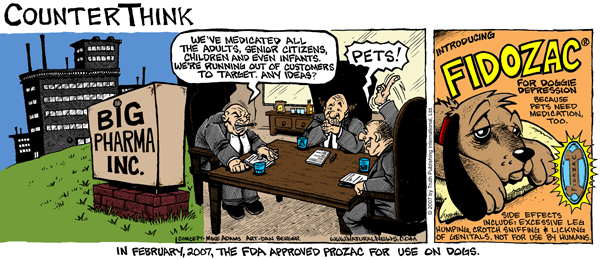Thursday, March 13, 2008
Wednesday, March 5, 2008
Quick! Break out the Emergency Genetic Test Kit!
Fido's got a new disease.
"Immune-Mediated Retinopathy, or IMR, causes loss of function in retinal cells and, in some cases, blindness in canines."
IMR is very similar to a previously known malady called Sudden Acquired Retinal Degeneration Syndrome or SARDS.So this is an(other) auto-immune disorder, where the body's immune system goes haywire and attacks itself. Funny there was an article just the other day about how these disorders are on the rise in humans.
Both diseases occur when the dog produces auto antibodies that attack the retinal cells. The antibodies mistake retinal cells for cancerous tumors or tissues that need to be destroyed.
In the process of attacking the retinal cells, the auto antibodies cause the retinal cells to lose function and the dog to lose some or all of its vision.
The difference between IMR and SARDS that Grozdanic identified is that the auto antibodies that attack the retinal cells in SARDS patients are produced in the eye. In the newly identified IMR, Grozdanic found that these auto antibodies are produced elsewhere in the dog and travel to the eyes in the blood.
Immune Systems Increasingly On Attack
Though the data are stronger for some diseases than others, and part of the increase may reflect better diagnoses, experts estimate that many allergies and immune-system diseases have doubled, tripled or even quadrupled in the last few decades, depending on the ailment and country. Some studies now indicate that more than half of the U.S. population has at least one allergy.Anecdotal reports say this seems to be the case for dogs too. And why not? Too many puppies and kittens are born into sterile environments, wormed from birth and weaned onto rice cereals... And then there is the unnatural high carb, grain laden diets they eat until the day the die. And the vaccines.
I could go on and on. So many causes. Will it suffer the same old cull`n`cure?
Monday, March 3, 2008
Dog's Health
(This blog originally posted on 11/22/2005.)
The other day, on a long cross country flight, Ms. X found herself thumbing through a copy of Men's Health Magazine abandoned in the seat back by a man in presumably perfect health (but why did he buy the copy in the first place? maybe he thought it said "Men's Wealth"...
oh, never mind).
On page after page she read promotions for vitamins and supplements; each sure to reduce your chances of having strokes, colon cancer, Alzheimers or this or that ailment. Each one had research supporting it's claims.
Now Ms. X has taken salmon oil supplements ever since Miss X announced her intentions many years ago. So her salmon oil lubricated brain flows thoughts along at a slicker than normal rate. And a question flowed by as she studied Men's Health.... Where's this kind of information for dogs?
Ch. Super Super Dog's breed club sent out a flier: "Send us five dollars and a quarter inch of dead puppy dog tail and we'll guess at how many genes you have to remove from Fido's gene pool to cure heart disease forever!
IF you ignore our request, or throw it in the trash you are a Bad breeder!"
Wouldn't it be easier to give Fido a salmon oil capsule every day?
"Our kibbles are 100 percent completely nutritionally balanced! Do Not Supplement!" Bark the dog food manufacturers.
And the breed club sends out another flier: "The Scientists of Top Dog Food Company present - 'Dangers of a homemade diet' at next months BIG SHOW. (If you don't come you're a Bad breeder!)"
So we have a catch-22.
The dog food manufacturers are interested in meeting minimal nutritional standards and maximizing profit. The breeders are interested in funding gene research, because they feel empowered to think they could eliminate a disease merely by selecting against it. After all, breeders have no control over what's in the kibble. And the kibble manufacturers want to control profits.
So Fido is caught in the middle, unable to read Men's Health. Maybe the geneticists could work on curing canine illiteracy. Ms. X might even donate a few whiskers for that, but the tails stay here.
Dog's Health - Berries
(This blog originally posted on 1/19/2006.)
Ask and ye shall receive!
Remember Ms. X asked where the nutritional research and supplement information for dogs was? (In the first "Dog's Health" post). Then, lo and behold, she found this great article about ellagitannins - "Berry Good Health" by Susan Thorpe-Vargas Ph.D.
Whoa. Ella is tanning? Ella McPherson? Ha, No. Just Ms. X. And there will be NO webcam in the tanning booth and I always tan fully clothed. So best go back and read the word again.
ELLA- JI -TAN-INS. It’s one of those biological terms. Here’s a definition “Ellagitannins are plant phenolics characterized by biaryl-coupled gallic acid moieties esterified to a D-glucose core” straight out of somebody’s doctoral thesis.
Guess what. Despite Ms. X’s obsession with technical factual detail, she doesn’t have a doctorate degree either. But the good Dr. Vargas gives simple explanations. These “things” are merely nutrients in plants that are effective in the fight against cancer (and other things).
Nutrients in some foods, primarily berries, that are good for you.
Just a couple quotes to whet your appetite:
Multiple studies have discovered that phytonutrients found in raspberries can protect us from cancer and can even shrink some types of cancer tumors. These substances can also act as an antibacterial and as an antiviral agent.
We live in a polluted environment. For instance, the outgassing from asphalt on a hot summer day produces the deadly carcinogen benzo{a}pyrene, the same chemical found on meat that has been charcoal broiled. This is just but one example. Exposure to such chemicals in the environment can cause the mutations in our genetic material that lead to cancer.
Not only is the medical delivery system failing but, our costs for health services are rising at an astronomical rate. What this means for the medical consumer is that we need to be more responsible for our own health. We need to look at prevention instead of always looking to health care providers to "fix" what exposure to a toxic environment and/or years of unhealthy lifestyle practices have wrought.Want more? Click the article link.

Yum.




.jpg)




 javascript:void(0)
javascript:void(0)